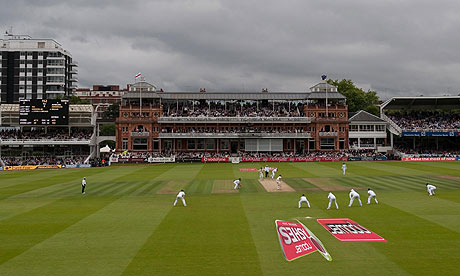http://www.guardian.co.uk/sport/2013/jun/29/england-wales-cricket-world-test-championship

England and Wales to host cricket's first World Test Championship
• Inaugural Test Championship to be held in 2017
• New event replaces ICC Champions Trophy
guardian.co.uk, Saturday 29 June 2013 18.21 BST

The ICC will replace the Champions Trophy with a World Cup of Test cricket to be played in England and Wales in 2017. Photograph: Gareth Copley/PA
The inaugural World Test Championship will take place in England in 2017, the International Cricket Council confirmed today.
The first staging of a long-planned event was in some doubt, as suggestions were that the Champions Trophy could be retained in its place, until the ICC committed itself to a Test championship on Saturday following its annual conference in London.
The tournament, part of a package of global events published between 2015 and 2023, will be hosted by the England and Wales Cricket Board in June and July of 2017 – and will move to India four years later, in February and March.
The ICC chief executive David Richardson said: "The ICC Champions Trophy in England and Wales [this summer] was highly acclaimed and appreciated by all. However, the principle of one pinnacle global event for each of the three formats over a four-year cycle is a good one – and as such, the ICC board has agreed to replace the Champions Trophy with the ICC World Test Championship.
"Now that the ICC World Test Championship has been confirmed, we'll work on the playing conditions and qualification criteria, and will submit these to the ICC board for approval in due course."
Also up for discussion by the ICC this week was the location of next year's ICC World Twenty20 – which is still scheduled to take place in Bangladesh. There have been mutterings about the readiness of a mandatory third venue for that tournament.
"The IDI [ICC Development International] board reviewed an inspection report by the ICC venue consultant on the venues for the ICC World Twenty20 Bangladesh 2014 and expressed its concern regarding the progress of construction and improvements to playing facilities in Cox's Bazar and Sylhet," said the ICC. "The board noted that a further inspection and report is scheduled for August, after which a final decision will be taken on the venues for the event."
Among other recommendations, the ICC also ratified a chief executives' committee decision to alter several playing conditions. Most notable perhaps is an updated policy when the umpires feel the need to change the ball in an international match. That subject was well-aired, when umpires Aleem Dar and Billy Bowden initiated a ball change while England were in the field against New Zealand during the Champions Trophy at The Oval.
There was much conjecture afterwards, with the former Test captain Bob Willis contending an England player had scratched the ball – a claim strongly denied by the national coach Ashley Giles, while the ICC saw no reason to investigate further on the basis of the umpires' match report.
The new condition, which will come into effect in October, states there will be a "formal introduction of a two-step process when the umpire believes the condition of the ball has been changed, but there is no eye witness to identify which player changed the condition of the ball: i) Replace the ball and give the captain a first and final warning; ii) award a five-run penalty to the batting team, replace the ball (with the batsman to choose) and report the captain under the ICC code of conduct."
Also agreed on Saturday is a recommendation that all full members play a minimum of 16 Tests in each four-year cycle.
Afghanistan are now officially an associate member country, the 37th, and Romania have been accepted as an affiliate.
The ICC has decided too that a player who wishes to return from eligibility with a full member to his original associate – for example, from England to Ireland – be reduced from four years to two.
The world governing body has also received a raft of recommendations to enhance its anti-corruption and security unit. Richardson said: "The ICC has a zero-tolerance approach towards corruption and is committed to using all powers available to it to achieve and maintain the goal of a corruption-free sport."
The subject of corruption in cricket has been high-profile again in the past month, following arrests made during this year's Indian Premier League and most recently the former Pakistan captain Salman Butt's belated admission to spot-fixing in 2010 – an offence for which he was subsequently banned, and still is.
Richardson added: "In the wake of recent events, the ICC and its member boards will further strengthen and tighten our anti-corruption codes and other integrity regulations, pertaining to international and domestic events and develop methods for better information sharing across jurisdictions.
"The ICC remains confident, but not complacent, that the vast majority of players, officials and administrators in international cricket uphold the best interests of the sport. But there continues to be a very small minority whose involvement with corrupt practices discredits them and their colleagues, and tarnishes the reputation of the sport itself."


 This will be terrible. Can you use Duckworth Lewis for test matches?
This will be terrible. Can you use Duckworth Lewis for test matches?